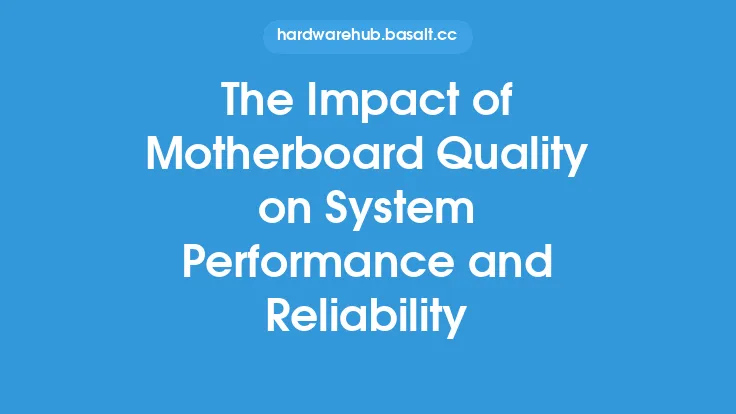When it comes to building or upgrading a computer, one of the most important components to consider is the RAM, or Random Access Memory. RAM plays a crucial role in determining the overall performance of a system, and one of the key factors that affects RAM performance is its speed. In this article, we will delve into the impact of RAM speed on overall system performance, exploring the technical aspects of how RAM speed affects system efficiency and productivity.
Introduction to RAM Speed
RAM speed, measured in MHz (megahertz), refers to the rate at which the RAM can transfer data. The faster the RAM speed, the more data can be transferred per second, which can result in improved system performance. However, the relationship between RAM speed and system performance is not always straightforward. Other factors, such as the type of RAM, the amount of RAM, and the system's overall configuration, also play a significant role in determining system performance.
How RAM Speed Affects System Performance
RAM speed affects system performance in several ways. Firstly, faster RAM speeds can improve the performance of applications that rely heavily on memory bandwidth, such as video editing software, 3D modeling tools, and games. This is because faster RAM speeds allow for more data to be transferred between the RAM and the CPU (central processing unit) per second, reducing the time it takes to complete tasks. Secondly, faster RAM speeds can also improve system responsiveness, as the system can quickly access and retrieve data from the RAM. This can result in faster loading times, improved multitasking, and a more responsive overall system.
Technical Aspects of RAM Speed
From a technical perspective, RAM speed is determined by the memory controller, which is responsible for managing data transfer between the RAM and the CPU. The memory controller uses a clock signal to synchronize data transfer, and the speed of this clock signal determines the RAM speed. There are several types of RAM, including DDR3, DDR4, and DDR5, each with its own set of speed grades. For example, DDR4 RAM is available in speeds ranging from 2133MHz to 3200MHz, while DDR5 RAM is available in speeds ranging from 4800MHz to 6400MHz.
RAM Speed and System Configuration
The impact of RAM speed on system performance also depends on the system's overall configuration. For example, a system with a fast CPU and a large amount of RAM may not see a significant improvement in performance from faster RAM speeds, as the CPU and RAM are already capable of handling demanding tasks. On the other hand, a system with a slower CPU and limited RAM may see a more significant improvement in performance from faster RAM speeds, as the faster RAM can help to compensate for the slower CPU. Additionally, the type of RAM used can also affect system performance, with some types of RAM, such as ECC (error-correcting code) RAM, offering improved reliability and stability.
Real-World Applications of RAM Speed
In real-world applications, the impact of RAM speed can be significant. For example, in video editing, faster RAM speeds can improve the performance of tasks such as color grading, 3D rendering, and video encoding. In gaming, faster RAM speeds can improve frame rates, reduce lag, and enhance overall gaming performance. In scientific simulations, faster RAM speeds can improve the performance of tasks such as climate modeling, fluid dynamics, and materials science. In general, faster RAM speeds can improve system performance in any application that relies heavily on memory bandwidth.
Conclusion
In conclusion, RAM speed has a significant impact on overall system performance, particularly in applications that rely heavily on memory bandwidth. While the relationship between RAM speed and system performance is complex and depends on various factors, including the type of RAM, the amount of RAM, and the system's overall configuration, faster RAM speeds can generally improve system performance and productivity. By understanding the technical aspects of RAM speed and its impact on system performance, users can make informed decisions when building or upgrading their systems, and optimize their RAM configuration for improved performance and efficiency.





